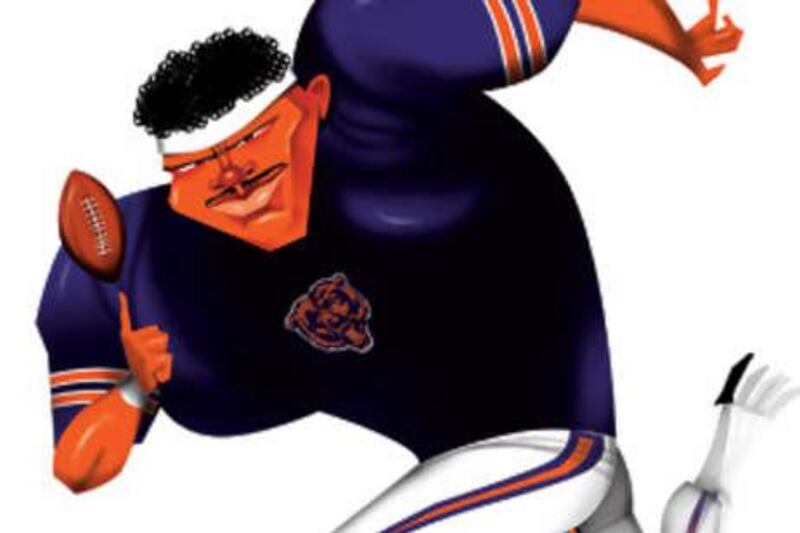Who do you think is sport's all-time best? Each week, we will profile a candidate, inviting you to decide who should top our list of 50. All participants will be entered into a draw for the weekly adidas prize and an end-of-contest Etihad Holidays four-day trip for two, including business class flights and accommodation, to a mystery location. We will reveal the full 50 at the end, but this week Rob McKenzie looks at gridiron's Walter Payton.
If you believe greatness must swagger, then do not vote for Walter Payton to win this contest. But if you believe greatness arises from diligence and leads to humility, then you could do no better than to text the number at the top of this page and lend your support to Payton. The gridiron legend played for the Chicago Bears of the National Football League from 1975 to 1987. His records included rushing yards in a game (275), career rushing yards (16,726), career rushing touchdowns (110) and career all-purpose yards (21,803).
The Bears were a so-so team for most of those years. They had Payton and little else. Quarterbacks who handed him the ball include such placeholders as Bob Avellini, Mike Phipps and Vince Evans. The Chicago coaches would sometimes resort to having Payton himself throw. He passed for eight touchdowns during his career, highly unusual for a running back. He was a sure-handed receiver, and to this day holds the Bears' record for career receptions.
He blocked like he enjoyed it. He even punted once. Such was Payton's versatility that his teammate Mike Singletary, a Hall of Fame defender, was moved to say: "He was the first running back I had ever seen who could have really been a great defensive player." His style was whatever suited the situation. He could butt with opponents or tap-dance around them. He would use a stutter-step to freeze defenders (an effect the Indianapolis quarterback Peyton Manning achieves nowadays with flailing and flapping at the line of scrimmage). He could fly over a pile at the goal line or, in the open field, send a cornerback flying with a stiff-arm. He had amazing balance, even when low to the ground.
There is a play against Green Bay where he twists sideways to thread between two defenders along the right boundary, falls forward after one of his blockers gets in the way, stretches his left arm toward the ground to restore his balance, smashes heads with a Packer while on his way back up, sends the Packer flying, turns full circle and emerges standing in the end zone as a chubby Chicago cop, allegedly providing security, jumps up and down on the sideline. Typically, he had done it without help from his mates.
In his rookie season, Payton compiled almost 1,400 all-purpose yards yet the feeble Bears went 4-10. Scores by which they lost included 35-7, 28-3, 27-7, 34-3, 46-13, 31-3, 38-10 and 28-7. In 1976 Payton became a star. He rushed for 1,390 yards, scored 13 times and was named an All-Pro. In 1977 he became a superstar: 1,852 yards on the ground, 16 touchdowns, league MVP. Then followed lean years. The running back piled up thousands of yards yet his Bears went in circles.
Payton did not moan or gripe. He never demanded a trade to one of the good teams; he disdained that as "the coward's way". He put his head down, did his job. It helped that he had a sense of humour - sometimes in pileups, he would reach out and untie a referee's shoelaces. After a touchdown he would hand the ball to a teammate, so they could spike it rather than he. He played in 186 consecutive games.
During those early years in Chicago, Payton would, in a fitting metaphor, strengthen himself by running up a hill. And when the Bears finally followed him up that hill, he did not stifle their success by trying to keep the attention where it had been for years, on himself. "I think he was the one guy that really worked hard at pulling that team together in the '80s when it could have come apart," his coach Mike Ditka said. "We were kind of a faction of offence and defence and he really worked hard at pulling it together and got each side to respect each other. We finally became a football team instead of an offence and a defence."
Just before twilight, the fates rewarded Payton. The Bears of 1985 - with a bull-moose coach in Ditka, a murderous defence led by Singletary and at last a quality quarterback in Jim McMahon - lost only one game en route to a Super Bowl coronation, a 46-10 thrashing of New E. Two seasons later, Payton retired. "I never skipped a down. I never took a rest,'' he said in sizing up his career. "All the glory, all the yards and all the touchdowns don't mean a thing. I came to play on every down and I never took a rest. That's how I want to be remembered."
In 1993 he entered the gridiron Hall of Fame. "Life is short, it is oh so sweet," he said in his induction speech. In 1999 he died of a rare liver disease. Walter Payton embodied the ancient virtues. He married once, was beloved by his wife and children, and was involved in charity work. He was a smiling stoic, an Atlas who carried Chicago on his shoulders. A vote for him is a vote for a deserving man.
@Email:rmckenzie@thenational.ae Cast your vote and enter a draw for a weekly Dh500 adidas voucher and a dream trip with Etihad Holidays. If you think Payton is the all-time best, text G33 to 2337 Texts cost Dh5 and voting will end at midnight on Thursday December 4.





